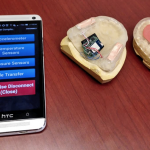 The last few years have seen a number of devices emerge that monitor our health and alert our doctors whenever things take a turn for the worst.
The last few years have seen a number of devices emerge that monitor our health and alert our doctors whenever things take a turn for the worst.
The latest such device has recently been developed by researchers at the University of Florida, who have designed a smart mouth guard to help sufferers of Bruxism (or teeth grinding to you and I).
Bruxism is surprisingly common, especially among those of us who are stressed, and can often manifest itself at night when we’re unaware of the symptoms.
A smart mouth guard
The researchers have developed a new mouth guard that has sensors in it to detect that you’re grinding your teeth, alert your dentist of it, and even provide you with some help on how to stop.
Not wishing to rest on their laurels, the next version of the mouth guard could even have athletic potential. For instance, it can detect hydration levels, whether the wearer is over heated or even if they have suffered a concussion.
The idea was born out of a desire to create a denture that would alert the dentist if it was ill fitted. The aim was to ensure the dentist was aware even if the patient themselves did not complain.
With bruxism arguably an even bigger problem, the researchers began to divert their attention in that direction instead.
It’s believed that around 20 percent of the population suffer from some form of bruxism. Stress is the leading cause of the issue, and if left untreated it can lead to a wide range of problems, including damaged teeth, insomnia and constant headaches.
What’s more, as it often happens at night, many sufferers are completely unaware they have the issue. Currently, the main way to diagnose the problem is to place the patient into a sleep clinic, which is costly and time consuming.
“Wearing a mouth guard is less intrusive than spending time in a sleep clinic,” the researchers say. “It cuts cost when it reduces the number of clinical psychology sessions.”
A smarter way
The new device offers all of these functions, and can send data to any computer or smartphone via Bluetooth. This can then be accessed by either the patient themselves or their dentist, who can make both a diagnosis and a suggested treatment.
The guard itself also offers an improvement over more traditional treatments, which often revolve around behavior modification training.
“The advantage is that the guard extends the treatment beyond the time spent in the clinic. This promises greater effectiveness and lower cost,” the researchers say.
With applications for both bruxism sufferers but also further afield into sporting fields, the innovation promises to be a rich and valuable one, and certainly something to follow with interest.
Amazing. Technology is wonderful at times.